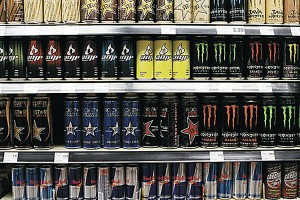Energy drinks are more popular than ever
By Christian Bouchard

A variety of energy drinks on display at a Sobey’s in Amhersturg Ont., Monday Oct. 27, 2014. Photo by Chrisitan Bouchard
With the increase in popularity and availability of energy drinks the industry is seeing huge growth as more and more young people choose to consume its products.
Consumption of these energy drinks can lead to anxiety, headaches, irregular heartbeats and heart attacks, research shows that many young people are continuing to consume them.
Ali Sahmhat, 16, said he believes the consumption of energy drinks has a lot of negative side effects and more people should do their research before drinking them.
“I think most people consume energy drinks because they don’t have the time to sleep or relax and they aren’t aware of what energy drinks actually are and the potential side effects associated with them,” said Samhat.
A recent government survey, led by Dr. Steve Suns shows that from 2007 to 2011 the number of emergency department visits in the U.S. caused by energy drinks doubled from 10,068 to 20,783. The data shows that people from ages 18-25 accounted for the largest group of patients by age.
Twenty-year-old University of Windsor student, Lauryn Bodde, said she thinks many young people are taking energy drinks to treat depression but forget it is only a temporary solution.
“Energy drinks are a temporary solution to boosting energy and that’s why people buy them. However, living a healthy lifestyle is a more long term solution,” said Bodde.
According to Health Canada, the level of caffeine in energy can range anywhere from 50 mg per can to 200 mg per can. The recommended maximum daily intake for most children and teens.
Jacqueline Martin is a first year early childhood education student at Fanshawe College. She said most people consume energy drinks because of how easily they can be purchased and consumed.
“People still buy energy drinks because just picking up an energy drink and being on their way is less time-consuming than taking the time to exercise,” said Martin.
There are many healthy alternatives to energy drinks and caffeine. Alternatives such as sleep, eating apples and drinking water are just a few. Samhat, however, said young people don’t think healthy alternatives are as effective as energy drinks.
“When you think of apples your mind associates it to nutrition, not energy. When you think of sleep, you associate it to exhaustion. When you think water, you associate it to thirst. But energy drinks are associated to energy. Whether that be true or not, that’s how our minds work,” said Samhat.
In 2011, researchers at the Rudd Center for Food Policy & Obesity conducted a comprehensive analysis of beverage marketing.
The results showed that advertising costs energy drink brands totaled $281.8 million in 2012, an increase of 71 per cent versus 2010.
Bodde said it is the consumer’s choice as to whether or not they purchase the product, regardless of the marketing tactics used.
“It’s the users decision on whether or not they want to purchase these products and whether they have done the research for themselves on how bad they are,” said Bodde.
Television plays the biggest role in the media’s tactics to attract more people into buying and consuming these drinks according to Samhat.
“There tends to be more energy drink advertisements in the evening and late at night, which is usually the time where people get back from work and are exhausted,” said Samhat. “Seeing professional teams advertising energy drinks helps you make the false assumption that energy drinks help you perform better when you’re tired, but truly they don’t.”
The problems linked with young people and energy drinks continue to grow. Martin said she would like to get the message about energy drinks danger out to the public.
“An increase in public awareness and education about potential harms of these drinks is all I could ask for. The more people who know about the risks, the better,” said Martin.


